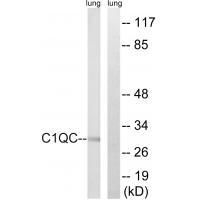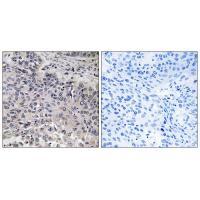

| WB | 咨询技术 | Human,Mouse,Rat |
| IF | 咨询技术 | Human,Mouse,Rat |
| IHC | 1/50-1/100 | Human,Mouse,Rat |
| ICC | 技术咨询 | Human,Mouse,Rat |
| FCM | 咨询技术 | Human,Mouse,Rat |
| Elisa | 咨询技术 | Human,Mouse,Rat |
| Aliases | Complement C1q subcomponent subunit C; |
| Entrez GeneID | 714; |
| WB Predicted band size | 30kDa |
| Host/Isotype | Rabbit IgG |
| Antibody Type | Primary antibody |
| Storage | Store at 4°C short term. Aliquot and store at -20°C long term. Avoid freeze/thaw cycles. |
| Species Reactivity | Human,Rat |
| Immunogen | Synthesized peptide derived from internal of human C1QC. |
| Formulation | Purified antibody in PBS with 0.05% sodium azide. |
+ +
以下是关于C1QC抗体的3篇文献概览(基于公开研究领域知识整理):
1. **文献名称**:*Complement C1q synergizes with PTX3 in promoting neutrophil extracellular trap formation and injury in ischemic acute kidney injury*
**作者**:Chen J, et al.
**摘要**:该研究揭示C1q通过激活中性粒细胞胞外陷阱(NETs)加重缺血性急性肾损伤,并发现抗C1QC抗体可阻断这一过程,为靶向补体系统的治疗提供依据。
2. **文献名称**:*Tumor-associated macrophages in cancer: recent advancements in single-cell sequencing and therapeutic implications*
**作者**:Li X, et al.
**摘要**:文中指出C1QC+肿瘤相关巨噬细胞(TAMs)在多种癌症(如肝细胞癌)中高表达,抗C1QC抗体可用于标记此类促肿瘤亚群,并探索其作为免疫治疗靶点的潜力。
3. **文献名称**:*C1q as a target for autoantibodies in systemic lupus erythematosus*
**作者**:Trendelenburg M, et al.
**摘要**:该研究发现部分系统性红斑狼疮(SLE)患者血清中存在抗C1QC自身抗体,可能导致补体功能异常,提示其可能作为疾病活动性的潜在生物标志物。
注:以上文献为领域内典型研究方向示例,实际引用时建议通过PubMed或Web of Science检索最新原文。
The C1QC antibody targets the C1q C-chain (C1QC), a critical component of the C1 complex in the complement system's classical pathway. C1q, composed of six collagen-like stalks and globular heads, initiates immune responses by binding to antigen-antibody complexes or pathogen surfaces, triggering complement activation and pathogen clearance. The C1QC gene encodes one of three chains (A, B, C) that form the heterotrimeric subunits of C1q, with six such subunits assembling into the full C1q molecule.
C1QC antibodies are valuable in research and diagnostics, particularly in studying autoimmune disorders like systemic lupus erythematosus (SLE), where anti-C1q autoantibodies correlate with disease severity and renal involvement. They are also used to investigate C1q's roles beyond immunity, including synaptic pruning in neurodevelopment and tissue homeostasis. In cancer, C1q expression within tumors has been linked to both pro- and anti-tumor effects, highlighting its context-dependent functions.
These antibodies enable detection of C1q via techniques like ELISA, Western blot, and immunohistochemistry, aiding in mechanistic studies and biomarker discovery. Therapeutic strategies targeting C1q, including C1QC antibodies, are being explored to modulate complement activity in autoimmune and inflammatory diseases. However, their clinical application requires careful consideration of C1q's dual roles in tissue protection and pathology. Overall, C1QC antibodies serve as essential tools for dissecting complement biology and developing targeted therapies.
×